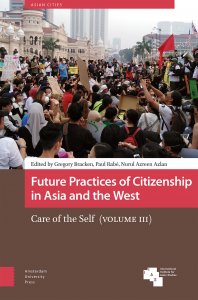Future Practices of Citizenship in Asia and the West investigates some of the greatest challenges facing society in the twenty-first century, including the struggle for rights and recognition by indigenous peoples, women, migrants, and the young, as well as the dampening effects some government responses to COVID-19 have had on artistic freedom and citizen participation. The ill effects of digitisation on citizenship, however, are tempered by some more positive approaches from grass-roots activities. Perhaps the most acute challenge facing the world today is climate change, an issue that can be both positive and negative, depending on how we respond to it. All the papers in this book share a people-centred approach based around Michel Foucault’s Care of the Self.
 “Reclaiming Democratic Citizenship While Tackling Covid-19 in South Korea”
“Reclaiming Democratic Citizenship While Tackling Covid-19 in South Korea”
